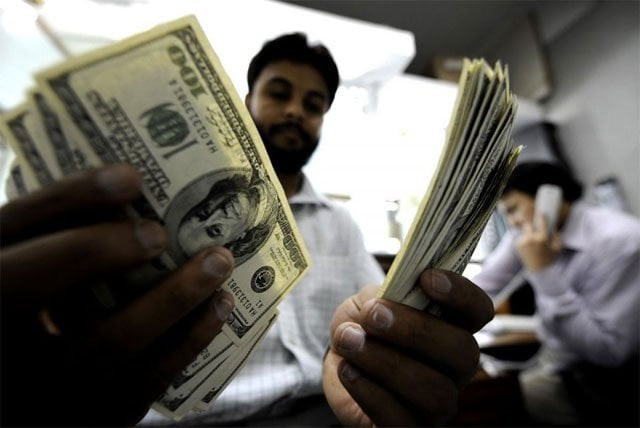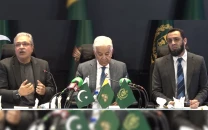Govt mulls taxing remittances
PM expected to make a formal announcement after chairing EAC meeting today

PM expected to make a formal announcement after chairing EAC meeting today. PHOTO: REUTERS
Sources in the Federal Board of Revenue said that the promulgation of the presidential ordinance remained a preferred choice of Prime Minister Shahid Khaqan Abbasi to enforce the much-debated tax amnesty scheme.
UK, US contribute more as Pakistan’s remittances increase 2.3%
“However, the government has yet to get the approval of the federal cabinet to promulgate the ordinance,” according to the sources.
PM Abbasi will on Thursday chair first meeting of the newly constituted Economic Advisory Council and discuss the proposed amnesty with its members.
After the EAC meeting, the prime minister is expected to make a formal announcement in this regard.
After the Supreme Court’s historic August 2016 judgment on the definition of the federal government, every piece of legislation has to be routed through the federal cabinet.
But from Monday, the Senate will be in session and a day later the National Assembly will meet.
During the time when parliament is in session, the president cannot promulgate an ordinance.
From next week, Prime Minister Shahid Khaqan Abbasi will also be visiting China to attend the Boao Conference.
The sources said the prime minister’s desire was that the issue of offering the one-time offshore tax amnesty scheme may be decided much before the upcoming budget session of parliament. The budget will be announced on April 27.
“The prime minister’s desires that the amnesty may be enforced through a presidential ordinance and will be embedded into the Finance Bill 2018 subsequently,” the sources said.
A second committee constituted by the Supreme Court to devise recommendations within three weeks has also almost completed its deliberations. The committee’s final meeting is expected in the next few days.
The prime minister has already announced to give the tax amnesty scheme to wealthy Pakistanis, offering them a chance to bring back their wealth stashed abroad.
The scheme is being contemplated in the aftermaths of tightening the noose around the tax dodgers – an initiative of the Organisation for Economic Cooperation and Development.
The sources said that one of the measures to be announced in the upcoming amnesty scheme will be to tax the remittances exceeding $100,000 a year. The purpose is to block a hole that has been historically used to whiten black money.
Under Section 111(4)(a) of the Income Tax Ordinance, the government cannot ask the source of foreign remittance.
The FBR and Supreme Court-constituted first three-member committee was of the view that Section 111 is used to whiten illegally-obtained money from Pakistan by declaring the funds to be foreign remittances.
The Supreme Court constituted the first committee had also suggested capping the question-free, tax-free flow of remittances to a reasonable level.
However, the $100,000 foreign remittance threshold may not help completely block this legal loophole.
According to the committee’s working, during 2016-17, only 2% foreign remittances handled by ten largest banks in the country were above the Rs10 million per annum threshold.
The political leadership is not ready to take a risk, as roughly $19 billion to $20 billion worth of foreign remittances per annum are a major support to Pakistan to handle its external financial accounts.
The sources said that the prime minister has also turned down a proposal to give immunity from the Anti-Money Laundering Act of 2010 to those who avail the amnesty scheme.
The Supreme Court constituted first three-member committee had also suggested that there should be no immunity from the prosecution under the Anti-Terrorism Act 1997 and the Anti-Money Laundering Act of 2010.
But those persons who would avail the scheme cannot be tried under the National Accountability Ordinance 1999, Foreign Exchange Regulations Act 1947, Income Tax Ordinance 2001, Prohibition of Benami Transactions Act 2017, Federal Investigation Agency Act 1974 and Companies Act 2017.
The sources said that there were still two views on extending the upcoming amnesty scheme to the domestic assets.
Tola Associates – a corporate advisory firm – has been advocating domestic assets amnesty as well.
Bitcoin start-ups in Asia take aim at remittances market
The company’s estimates showed that a minimum of $100 billion of the domestic economy was undocumented.
According to it, the real estate sector comprises around 50% of the parallel economy and it has been the most lucrative for parking funds due to huge differences between the fair market value of properties and the deputy collector rates.


















COMMENTS
Comments are moderated and generally will be posted if they are on-topic and not abusive.
For more information, please see our Comments FAQ